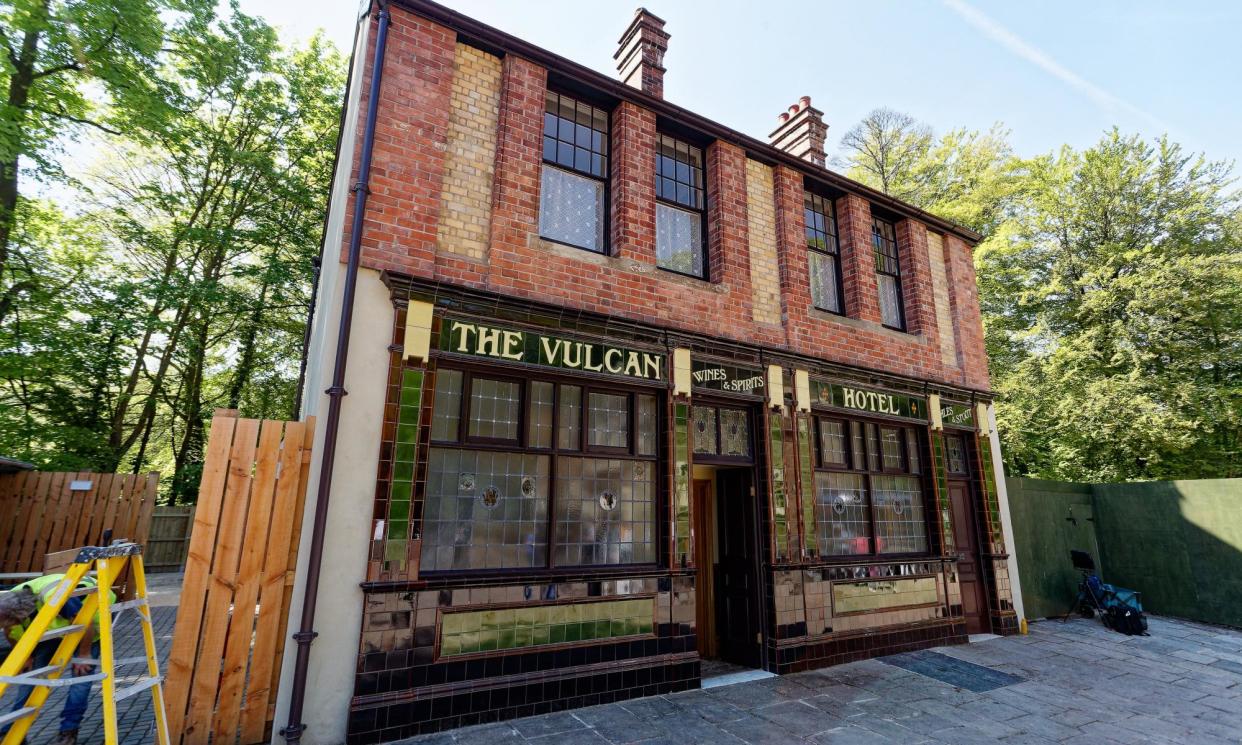Beloved Cardiff pub demolished in 2012 reopens after brick-by-brick rebuild on new site

For more than a century and a half, the Vulcan Hotel served dockers, railway workers, artists, sports stars, gamblers and dreamers and the demolition in 2012 of this beloved, spit-and-sawdust Cardiff pub felt like a bereavement.
Twelve years on, the pints are about to flow and the pickled eggs served again after a painstaking project to move the old alehouse brick by brick to a new site and reopen it as a working pub.
“It feels weird but wonderful,” said Gwyn Lewis, who was the Vulcan’s landlord when it was flattened, as he walked for the first time into the reconstructed, revamped pub, now to be found on the edge of the Welsh capital at the St Fagans National Museum of History.
The stories began to pour out. How James Dean Bradfield, of Manic Street Peachers (who once told the Guardian that it was the “perfect example of an old-fashioned Welsh pub, beautifully basic”), used to come in for a quiet drink but would then get his guitar out for an impromptu gig.
How a couple of New Zealand rugby internationals liked to pop in for a pint when the All Blacks were playing Wales. “They were the very devil to get out,” Lewis said. And how the pub used to open on a Sunday, though they knew only six regulars would turn up. “Very old, they were,” said Lewis. “They used to call the pub God’s waiting room.”
Lewis was keen have a look in the gents, which, now as then, houses an extraordinary urinal – bulbous in shape, orangey in colour. “They’ve even got that in – brilliant,” he said.
The Vulcan originally stood at 10 Adam Street in Cardiff, in an area then known as Newtown, which was built from the 1830s to house the growing workforce needed to construct and service Cardiff docks.
It was first registered as an “ale house” in 1853 and at the start of the 20th century it was remodelled and a bright tiled facade added. In 1915 the pub was managed by a couple called Denis and Julia MacCarthy and the museum’s researchers tracked down their daughter, Ellen, to record her memories.
She described how at that time working men drank in the main bar while couples tended to gather in the better-appointed smoke room and women gathered in a cramped passageway.
Customers were allowed to run up tabs – but had to leave their sets of false teeth as collateral, which were kept in a bucket of water. It is still possible to see the scratch marks in a wooden panel made by the pub’s guard dogs.
In the 1960s Newtown was demolished and the community dispersed. The pub, which had been surrounded by houses, stood alone but still drew artists, singers and students.
By 2008 the Vulcan faced demolition. There was a campaign to save it but its final night of trading was 2012. An asset management company that owned the building offered it to National Museum Wales.
Janet Wilding, head of the historic buildings unit at the museum, remembers the pub’s final days. “It was caked in nicotine but it always had a really good atmosphere. It was known for having the best beer in Cardiff because the cellar was next to the canal so it was naturally cool.”
The museum has restored the pub as it would have been in 1915. It has sawdust on the floor and a spittoon, though Hayley Budd, who will be running it, said she would not be happy if anyone used it.
Original bricks and stone have been cleaned and replaced. The glass from the from 1915 facade survives. Sadly, wonderful tiles from the frontage could not be rescued but the museum went to the Shropshire company that made them and it used the original moulds to create new versions.
The Vulcan reopens on 11 May, offering beer produced by the local Glamorgan Brewing Company as well as pickled eggs and pork scratchings. Seventy five members of the MacCarthy family are travelling from across the world to join the celebrations.
Dafydd Wiliam, principal curator historic buildings at the museum, said: “It’s a legendary Cardiff pub and represents all the pubs that we’ve lost not just in Cardiff but around Britain. It’s a terrible shame because they’re really valuable community spaces.”
Another previous landlady, Liz Smart, once said the Vulcan “like Star Trek” would live forever. That may be a little optimistic but the Vulcan certainly has a new lease of life.

 Yahoo News
Yahoo News 
